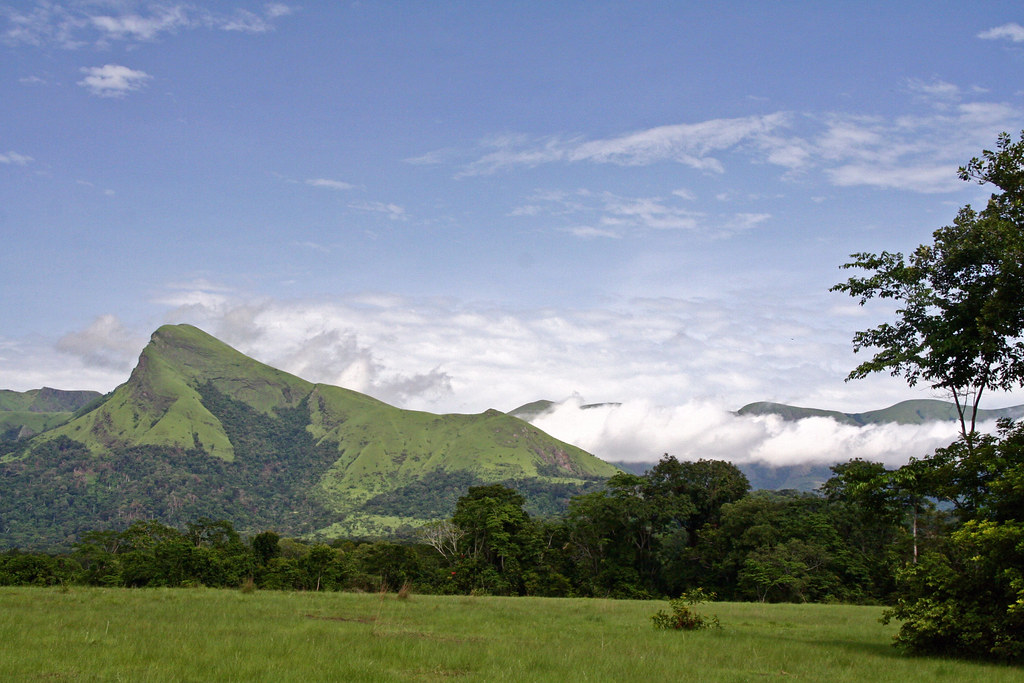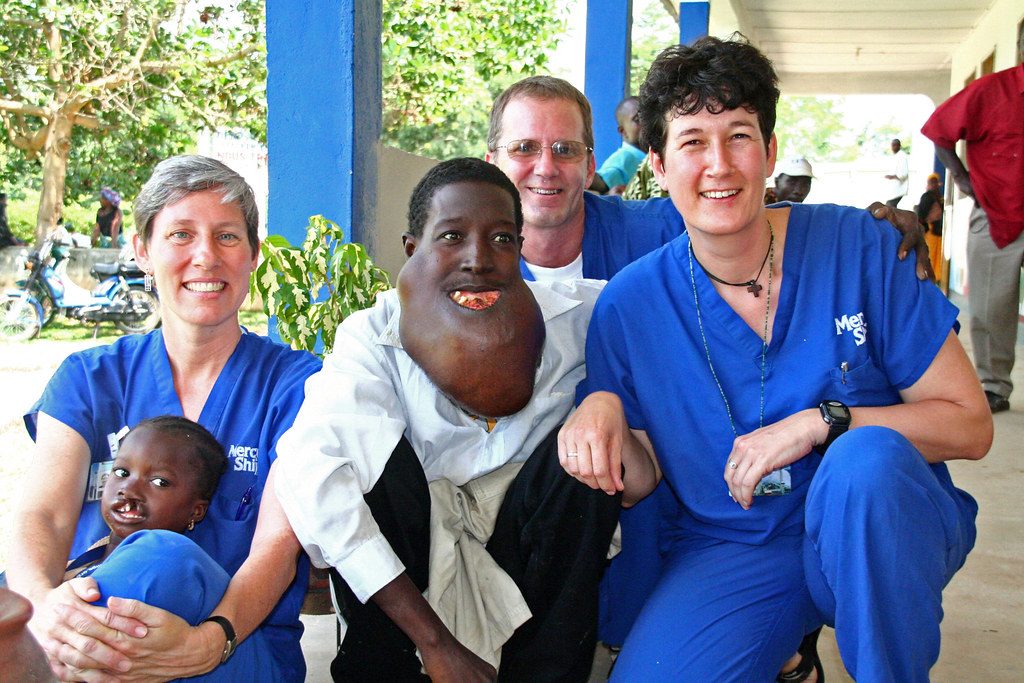
I had no plans of visiting Guinea. The trip to Robertsport was enough off-road adventure for one outreach. I thought.
But, the ship maintains a departures and arrivals list, available publicly (to the crew, at least). I was perusing the this list one day, bemoaning the constant exodus of outright amazing people, when I ran across my name. Evidently, I was leaving the ship on May 6.
I had no idea.
Turns out, it had been decided that I was joining a group of four others and heading up-country—and out of country—to Guinea, in search of more patients. See, despite a wildly successful screening day in February, the entire surgical schedule wasn't filled (this, likely, is due to the fact that the ship has been in Liberia a few times before—it's actually made a dent in the need here). So, every few weeks, teams have been sent out to other parts of Liberia, further afield from Monrovia, looking for patients who might have been missed. We're flinging out a broader net.
The net, on May 6, was to extend to the eastern portion of Guinea, to the section of the country, just across the Liberian border, called Guinée Forrestière. Of the four topographic sections of Guinea—from west to east, they are Basse-Côte, a thin band of coastal land encompassing Conakry, The Fouta Djalon plateau, Haute Guinée, and finally Guinée Forrestière—the latter is the furthest away from the capital, which is where the Africa Mercy will dock the next time it visits the country. As a result, Guinée Forrestière is better served from Liberia than from its own port, 24 hours away.
It was, therefore, to the virgin African rainforests of Guinea that we set out, across roads that started out pretty well (and ended up making us thankful for four-wheel-drive control), toward N'Zérékoré, an NGO hub, and the biggest city in the region. Just outside of N'Zérékoré is a small village called N'Zao, and a mission hospital at which we were based.
Let me tell you: land borders are the same, the world over. And they are infinitely more fun than any airport immigration, because, for the most part, they are shacks, staffed by bored men and their muscid companions, and adorned with tattered calendars of yesteryear. The land border between Liberia and Guinea is no different. Except that the calendar of yesteryear was juxtaposed with a ghastly photodocumentary of Saddam Hussein's execution.
The land border is to your left as you drive, just before the leper colony (no, I'm not making that up). There are five checkpoints, each a little more thinly-veiled attempt at extracting your money than the other. There is only one such checkpoint on the Liberian side; the rest are across the bridge. That's right: four checkpoints before Guinea lets you into its embrace. It's a long, protracted no-man's land, filled with plenty of men. And women. And children. And livestock.
Which, incidentally, you don't notice are missing from Liberia until you leave the country. Guinea has livestock everywhere. You wonder where Liberia's all went; unfortuantely, the gruesome truth is that they were all eaten during the war. But not so in Guinea. The road is littered with fowl (guinea- and otherwise), pigs, goats, sheep, dogs, and cats.
Once you enter no-man's land, the demigod that sits enthroned in each checkpoint expects a little gift from you. On our way into Guinea, we were guided by a man who's lived there for nearly two decades and were therefore shielded from these dealings. On our way back, we weren't. And, I didn't realize that this was the culture until I walked out of our first checkpoint with all five passports, having thanked the guard, shaken his hand, and sprinkled blessings on his family. As I was leaving, he called to me, "Et quoi? Tu n'as rien pour moi?"
Thankfully, our hosts in Guinea had anticipated this turn of events. They had given us enough calendars (yes; calendars) for each checkpoint. This small offering seemed to appease the little demigod, and we were let through. It worked on all the others, too. Who would have thought? I may try the calendar gambit on my way into Canada.
I'm just starting to get comfortable with this African way of dealing with things. Case in point: on our second day in Guinea, we were taken up the Nimba mountain range. It forms part of the border and is eminently climbable from the Liberian side; it's a common trip for crew from the ship. The Guinean side, though, has been taken over by a mining company and is closed to foreigners. Except that one of our hosts knew someone in the local government, who knew someone else, who took the day off to show us around. And to show off his political muscles at the mining company's gate.
Because of this man's clout (I never got his name. He was simply known as The General), we were welcomed at the mine by its director. Whose smirking first words to us, followed closely by a conspiratorial guffaw from his underlings, were, "I'm glad your primary concern is healthcare and not the environment." We were shown around the compound, given lunch, and sent away on a tour of the region.



When all was over, The General also graciously took us to his home, to meet the mayor, and to dine (again) on rice, well water, and boiled kidney and liver. I'm not making that up, either.
The screening was a success, by the way. Twenty-two patients will come down to the ship in the next few months for their operations. One of these has already done so. 
For this man, a twenty-two-year-old economics student, the boiled kidney was worth it. Despite a six-and-a-half-pound tumor growing on his face, he was one of the kindest men I've met. For a third of his life, he'd had this tumor on his jaw, subjecting him, likely, to insane amounts of ridicule. But when the cameras came out, he dove into each one's field. His smile was infectious. His attempts at befriending a child with a cleft lip and palate were heartfelt (if immediately rebuffed; she's in the picture too). And as I write, he's asleep on the wards. Six and a half pounds lighter.
18 May 2008
The etiquette of calendars
More pictures from the trip are here.
Posted by
M
at
5/18/2008 07:47:00 AM
![]()
Subscribe to:
Post Comments (Atom)





3 comments:
Man, kidney is good...but usually lacks taste boiled. A little (marinated if possible) lung skewered and grilled over African charcoal.
Now thats tasty.
Stephanie was telling me about watching him in ICU...whew, Lord BLESS HIM!
Dude I am gonna stop reading your blog. I always cry. Hearing your stories just makes "it" all a little to real. It's a bit much for my comfortable middle class American life. Sarcasm aside.. God bless you and your crew mates for all for that you do.
I happened upon you via an adoptive mom's blog and am so glad I did. A gentleman came to my church, Grace Church of Fredericksburg, and my boys and I were really inspired by the videos, pictures, and stories. My oldest asked to be put on the mailing list and I wonder if he may have been inspired to become a doctor in order to do things like ya'll do.
Anyway, I'm bookmarking and will bring him back to your blog with me next time I come.
Thanks for sharing!
Melissa
Post a Comment